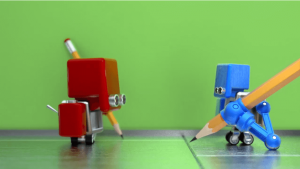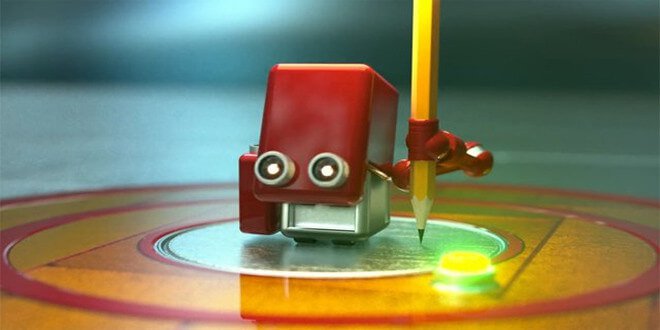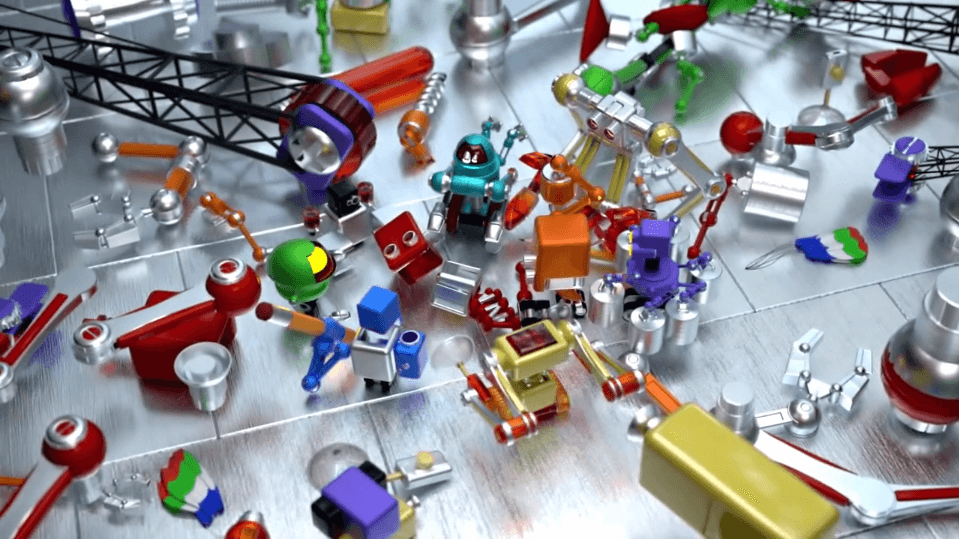What a Robot Can Teach Us About Resentment and Jealousy

Many of us have the idea that each person could be or become perfect. This, however, is an illusion. We all strive to do things well and to enjoy what it is we are doing. But we can lose ourselves in the idea of being better than everyone else. This can introduce us to the downward spiral of resentment and jealousy.
Comparing ourselves with others does not serve us. Each individual has lived and experienced situations, feelings, and thoughts that are different than everyone else’s. Therefore, the comparison is futile.
How far are we willing to go in order to not feel inferior to others? How do we confront the changes in our lives? Do we cultivate flexibility or, does rigidity and unbending structure dominate our days?
When change arrives in our lives, be it in our jobs, social lives, or personal, we have to be flexible enough to know how to adapt, without forgetting who we are. On the other hand, the consequences can become negative. This is what happens to the protagonist of this short film, from whom we can learn an important lesson.

When inferiority appears
At some point in our lives, we may feel “inferior” relative to the other people around us. Maybe we are going through a hurricane of changes, or simply realize that someone else has great skill and certain abilities that we do not.
This is what happens to the little robot of the film, who starts out being used to his daily routine in which he feels comfortable and happy carrying out his tasks. But all of a sudden, he is broken by the appearance of another robot, who is faster and has greater abilities. As a result our protagonist enters into a downward spiral of jealousy and resentment…What happens to him?
“No one can make you feel inferior without your consent.”
-Eleanor Roosevelt-
When we compare ourselves to others and consider ourselves “inferior” or “worse,” we begin to doubt our abilities and skills. This doubt generates a total lack of self-confidence and damages our self-esteem.
There can be various consequences when faced with a situation like this. We can reach a state of defenselessness in which we don’t believe we are capable of doing anything. This state of mind induces immobility and we tend to depreciate ourselves and our values.
However, we can also want to try and overcome this and continue evolving in order to keep ourselves from losing track and falling off course. The problem arrives when we direct our energy towards the destruction of others, rather than the betterment of ourselves. We may turn that burning negative feeling of inferiority outwards, and try to upset or destroy what others do, their jobs, their attitudes, and their relationships.
When motivated by envy and resentment, instead of learning a lesson on how to improve ourselves, we may focus on how we can bring down that which makes us feel inferior. In other words, our attention is directed outwards, instead of inwards.
In this way, we put the responsibility of our unhappiness and feeling of inferiority on others, when, in reality, it is actually a perception we have formed about ourselves. This important lesson is exemplified in what happens to our little robot in the film.
Avoid breaking by being flexible
Whether or not we are trapped in unhappiness, resentment, and jealousy, the only option we have is to learn how to be flexible and adapt. Acceptance of a new situation or of other people’s skills and strengths is the beginning of our personal change.

The alternative is to take responsibility for what we feel and to be conscious that we are the ones who consider ourselves “inferior,” “better” or “worse.” We create our own filter through which we see the world, and we base our actions on that filter . Inevitably, this can greatly affect our level of self-esteem.
“If you decide to be flexible, you will free yourself from an enormous weight upon seeing that nothing is predetermined and that you can be final judge of your own behavior.”
-Walter Riso-
Feeling jealousy or resentment, or thinking that we should unseat others to overcome them, are thoughts and feelings generated by our own insecurity. We ourselves are the ones that sometimes make ourselves the enemy of others, creating a struggle of suffering and lack of well-being in an attempt to replace them.
This is what happens to our little robot friend. Dominated by his own insecurity, he turns a situation of collaboration into one of competition due to his own rigidity, resentment, and jealousy. This brings about his own destruction…
Therefore, remember that you are only inferior if you consider yourself to be so, and give others permission to think of you as such. Remember that competing in order to bring someone else down is never a good choice for being happy. However, collaborating, working together, and being flexible in order to improve can be the best option in order to improve ourselves and bring creativity, rather than destruction. The story of this little robot teaches us this important and essential life lesson.
Many of us have the idea that each person could be or become perfect. This, however, is an illusion. We all strive to do things well and to enjoy what it is we are doing. But we can lose ourselves in the idea of being better than everyone else. This can introduce us to the downward spiral of resentment and jealousy.
Comparing ourselves with others does not serve us. Each individual has lived and experienced situations, feelings, and thoughts that are different than everyone else’s. Therefore, the comparison is futile.
How far are we willing to go in order to not feel inferior to others? How do we confront the changes in our lives? Do we cultivate flexibility or, does rigidity and unbending structure dominate our days?
When change arrives in our lives, be it in our jobs, social lives, or personal, we have to be flexible enough to know how to adapt, without forgetting who we are. On the other hand, the consequences can become negative. This is what happens to the protagonist of this short film, from whom we can learn an important lesson.

When inferiority appears
At some point in our lives, we may feel “inferior” relative to the other people around us. Maybe we are going through a hurricane of changes, or simply realize that someone else has great skill and certain abilities that we do not.
This is what happens to the little robot of the film, who starts out being used to his daily routine in which he feels comfortable and happy carrying out his tasks. But all of a sudden, he is broken by the appearance of another robot, who is faster and has greater abilities. As a result our protagonist enters into a downward spiral of jealousy and resentment…What happens to him?
“No one can make you feel inferior without your consent.”
-Eleanor Roosevelt-
When we compare ourselves to others and consider ourselves “inferior” or “worse,” we begin to doubt our abilities and skills. This doubt generates a total lack of self-confidence and damages our self-esteem.
There can be various consequences when faced with a situation like this. We can reach a state of defenselessness in which we don’t believe we are capable of doing anything. This state of mind induces immobility and we tend to depreciate ourselves and our values.
However, we can also want to try and overcome this and continue evolving in order to keep ourselves from losing track and falling off course. The problem arrives when we direct our energy towards the destruction of others, rather than the betterment of ourselves. We may turn that burning negative feeling of inferiority outwards, and try to upset or destroy what others do, their jobs, their attitudes, and their relationships.
When motivated by envy and resentment, instead of learning a lesson on how to improve ourselves, we may focus on how we can bring down that which makes us feel inferior. In other words, our attention is directed outwards, instead of inwards.
In this way, we put the responsibility of our unhappiness and feeling of inferiority on others, when, in reality, it is actually a perception we have formed about ourselves. This important lesson is exemplified in what happens to our little robot in the film.
Avoid breaking by being flexible
Whether or not we are trapped in unhappiness, resentment, and jealousy, the only option we have is to learn how to be flexible and adapt. Acceptance of a new situation or of other people’s skills and strengths is the beginning of our personal change.

The alternative is to take responsibility for what we feel and to be conscious that we are the ones who consider ourselves “inferior,” “better” or “worse.” We create our own filter through which we see the world, and we base our actions on that filter . Inevitably, this can greatly affect our level of self-esteem.
“If you decide to be flexible, you will free yourself from an enormous weight upon seeing that nothing is predetermined and that you can be final judge of your own behavior.”
-Walter Riso-
Feeling jealousy or resentment, or thinking that we should unseat others to overcome them, are thoughts and feelings generated by our own insecurity. We ourselves are the ones that sometimes make ourselves the enemy of others, creating a struggle of suffering and lack of well-being in an attempt to replace them.
This is what happens to our little robot friend. Dominated by his own insecurity, he turns a situation of collaboration into one of competition due to his own rigidity, resentment, and jealousy. This brings about his own destruction…
Therefore, remember that you are only inferior if you consider yourself to be so, and give others permission to think of you as such. Remember that competing in order to bring someone else down is never a good choice for being happy. However, collaborating, working together, and being flexible in order to improve can be the best option in order to improve ourselves and bring creativity, rather than destruction. The story of this little robot teaches us this important and essential life lesson.
This text is provided for informational purposes only and does not replace consultation with a professional. If in doubt, consult your specialist.







